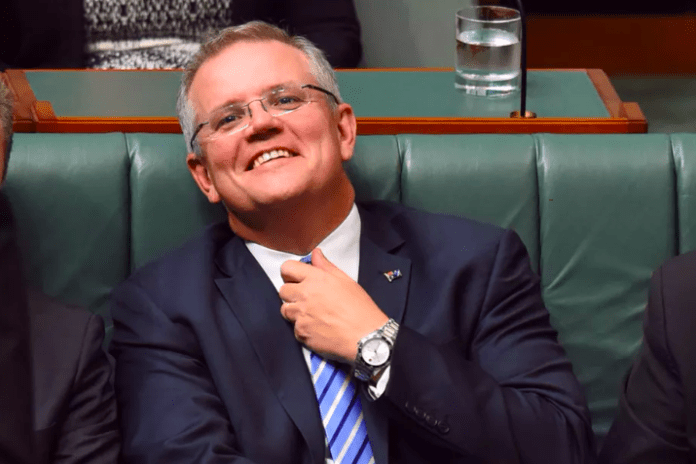Treasurer Scott Morrison is working hard to sell his make or break 2018 budget, which is centred around tax cuts. The big picture purpose of these tax cuts is keeping the federal government’s tax to GDP ratio (the proportion of the economy the government takes in tax) at or below 23.9%. His ultimate justification comes down to this claim made in his post budget interview on the ABC program 7:30:
“Higher taxes weaken your economy. It actually slows your growth, it costs jobs, it makes you less resilient.”
There has been a lot of academic research into this issue and, of course, the story is a lot more complicated than Scott Morrison’s simple assertion. For very low taxing countries, there is indeed a relationship with economic growth — lower taxes mean lower GDP growth. After that, the results are all over the place and depend on many factors, not least of which is the mix of taxes. Amongst the most economically successful countries there exist high taxing, low taxing and average taxing governments.
Why then, have Morrison and Turnbull imposed this “speed limit”?
There are some things that are linked with higher tax to GDP ratios:
· lower inequality
· better population health outcomes
· better education across the population
· lower crime rates
· less poverty
But, of course, we don’t want all those things, do we? Surely, we’d rather have $10 per week in tax cuts.
If the tax cuts aren’t really about jobs and growth, what are they about? Let’s turn that first dot point around. Countries with lower tax to GDP ratios tend to have higher inequality. Higher inequality, of course, means a greater share of economic output going to the rich. Ok, now we’re onto the real reason for imposing this seemingly crazy “speed limit” on tax to GDP.
It’s about maintaining and increasing inequality because increasing inequality means increasing the proportion of the country’s economic output going to the rich.
Make no mistake: big business and rich individuals are the Liberal party’s real constituents. Occasionally, policy decisions make this obvious. The Coalition’s two big tax cut proposals represent just such an occasion. The big business tax cuts are opposed by the majority of Australians of all political persuasions, and there is no clear evidence that they will have the claimed effect of lifting employment and wages. Similarly, the Coalition’s personal income tax cuts package is so skewed towards high income earners that Morrison’s claim it is for low and middle income earners is textbook Orwellian double speak.
The very wealthy and their political advocates justify their wealth through two main beliefs: that they are wealth and job creators; and that they earned their wealth through hard work and therefore deserve it (the flipside of which is that the poor deserve their poverty).
The fact that success, wealth and power are far more likely to be an accident of biography than they are to be a result of genuine talent, and hard work is very rarely acknowledged by the rich and successful.
Can it really be argued that an investment banker works harder than the person on night shift who cleans their office — or any of the other low-paid people who make their accumulation of wealth possible? If we trace their respective histories back, we will almost invariably find that the banker was born into a well-off family and went to an expensive private school with the children of other well-off parents. We know that the connections made at that school play a bigger part in determining that banker’s future salary than school grades or university degrees or innate intelligence. Of course, there are exceptions. Very occasionally somebody born into poverty becomes extremely wealthy and powerful — like… hmm… nope, can’t think of an Australian example right now but I’m sure there are a few.
I think the Liberal party genuinely believe that, by providing tax cuts to the rich, they will allow the captains of industry to employ more people and propel the country forward.
If you want to understand this line of thinking, read some Ayn Rand (try Atlas Shrugged), a little-known author who has a cult following among those who attend expensive private schools. The heroes in Ayn Rand novels are the straight talking, get-stuff-done captains of industry who are constantly held back by the mediocre masses and the tall poppy hunting bureaucracy. The path to a prosperous society is, of course, to just get out of their way and let them use their wealth, power and talent to make a better world for everyone.
Of course, what really happens when you get out of the way of those with wealth and power is that they use their wealth and power to accumulate more wealth and power. If you want proof, just look at the banking royal commission.
I think there are two types of people who believe the Ayn Rand myth: those with wealth and power; and the extremely gullible. I reckon the same is true of support for the Turnbull and Morrison tax cuts.

